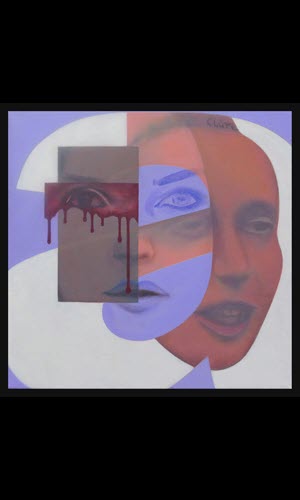Masques of the Disappeared
 I should confess from the start that I am not qualified to review an art book, let alone a book of the sort of fine art that Judith Clute produces. If you want the view of an expert in art, and the philosophy of art, read the essay by Pamela Zoline which appears at the end of this book. Hopefully it will appear, at some point, on Judith’s website at some point in the future.
I should confess from the start that I am not qualified to review an art book, let alone a book of the sort of fine art that Judith Clute produces. If you want the view of an expert in art, and the philosophy of art, read the essay by Pamela Zoline which appears at the end of this book. Hopefully it will appear, at some point, on Judith’s website at some point in the future.
What I can say is that much of Judith’s art is very familiar to me. I have visited the Clute home in London on many occasions. The spare bedroom also doubles as Judith’s studio, so I have actually slept next to several of these paintings while they were in production. That’s going to make the next paragraph sound weird.
Judith’s work is haunting. Not, I hasten to add, in a way that terrifies. Rather she produces images that stick in the mind. If they were music you might say they were good at earworming you. It is never obvious what a painting is about. I’m not entirely sure whether there are specific things that they are supposed to be about. But they always look as if they are about something. You know that the collection of images that makes up each painting have been selected for a purpose, to evoke thoughts and emotions. But, like a haunting, that meaning is often vague, unclear, transparent, leaving you grasping for substance. You don’t know what you are seeing, but equally you can’t forget it.
Masques of the Disappeared is not a book that you will find in Waterstones of Barnes & Noble. Only 100 copies have bene printed. Quite a few went at the launch event in London, which was attended by many of the well known names of the London SF&F community (plus myself). I believe that there are still copies available. Instructions for purchasing a copy are available here.
One of the questions that Zoline asks in her essay is, what does it mean to create original art in an age of image saturation. Photography, and now AI-assisted art, have made the creation of images available to everyone. Mechanical reproduction means that everyone can afford a cheap copy of the Mona Lisa to hang on their wall. Art books would have been impossible only a few hundred years ago. But I don’t think that this makes original art unnecessary. I think it makes it even more rare and wonderful. We should value and encourage the people who produce it.